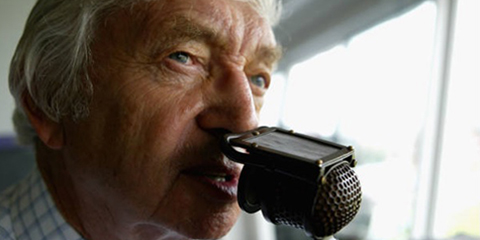Richie Benaud: Cricket's greatest all-rounder, captain and voice who defined the game
JournalismPakistan.com | Published: 24 August 2025 | Dr. Nauman Niaz (TI)
Join our WhatsApp channel
Richie Benaud was a legendary cricketer known for his exceptional all-round abilities and insightful commentary. His legacy continues to influence cricket today.Summary
Cricket, for all her endless dramatis personae, had rarely encountered a figure who seemed to give so much of himself, and in return, become so much of her. Few — perhaps none — stood as synonymous with the game as Richie Benaud. He was not merely a player, not merely a captain, not the broadcaster whose voice became the soundtrack of summers; he was the connective tissue of cricket itself.
The Voice That Became Cricket's Soundtrack
I grew up listening to Richie Benaud's voice. Crisp, technical, lyrical, yet never indulgent, always evocative in its economy. He was a broadcaster who made silence as powerful as words, pauses as eloquent as analysis. I had never seen him play, but the voice compelled me backwards in time. I began scouring VHS tapes, rummaging through shelves until his playing days flickered before me in grainy images. And there he was: alpha, brilliant, impactful. An aggressor, yet precise. A leg spinner with the spirit of a fast bowler, bristling with intent. And he could bat, too, not just capably but with poise, with grace, with that faint touch of arrogance which marks the great from the good.
Richie Benaud's Revolutionary Cricket Leadership
As a captain, he was brave, shrewd, unfailingly ahead of his age. He led not by weight of reputation alone but with a mind that shaped the game anew. Watching him in those tapes, I began to understand why his name still hovered like a watermark over every generation that came after. And then, inevitably, I returned to his commentary, the place where Richie had become eternal. To hear him was to hear cricket itself breathe. Channel Nine, the BBC, Test Match Special, his cadence became inseparable from the game's pulse.
Meeting the Cricket Legend: A Broadcasting Encounter
I dreamt of meeting him. I dreamt of autographs, of holding in my hands even a sliver of the myth that was Richie. Little did I know that life, with its odd symmetry, would one day carry me into broadcasting, and not just into its fringes but into its very heart. By 2005, during that Ashes that will live in memory as one of cricket's great epics, I found myself not only listening to Richie but sharing a studio with him.
The run orders were prepared, monologues polished, and confidence in place. But when he walked in, immaculate in dress, aura intact, experience trailing him like a long shadow, I was reduced to awe. My hero worship stood naked before me. Richie Benaud in flesh, not as a grainy silhouette or a disembodied voice, but in presence. And what presence it was. I was meant to be confident, meant to be seamless in my hosting. Instead, I was awestruck, almost undone.
The Master's Wisdom: Lessons from a Cricket Icon
He noticed, of course. Richie noticed everything. And slowly, gently, he opened up. What followed was not just an interview but an initiation. He began to share not only stories, but reservoirs of experience. Feedback offered like gifts, secrets of voice control revealed like old codes. His knowledge of pacing, of modulation, of when to whisper and when to soar, these were lessons disguised as casual advice, but they settled deep within me. Each word felt like a master handing down a craft.
At the end, I hesitated. He was a man dressed not just in clothes but in aura, in the celebrity and sobriety of a lifetime. Yet the fan within me refused silence. I fumbled with a bunch of photographs, reluctant but determined. 'Would you mind?' I asked. He took them without the faintest trace of irritation, smiling that half-smile of his. 'Leave them with me. You can collect them from the hotel,' he said.
Richie Benaud's Enduring Humility and Grace
It was humility at its most profound, humility not contrived, not performed, but effortless. Here was a man who had shaped cricket in the 1960s, redefined how it was seen in the 1970s, and then gave it a voice in the 1980s and beyond. And here he was, treating an awestruck younger broadcaster with a courtesy that felt like a benediction. That was Richie Benaud. To me, he was never just a commentator or a captain or a player. He was the rhythm of cricket itself. And to have sat across from him, to have heard him speak not to millions but to me alone, was to know that sometimes dreams do not just come true, they arrive dressed in cream suits, with perfect hair, in immaculate understatement.
Consequently, I was blessed with the richness of his company, moments stretched across time like rare treasures gathered in quiet succession, until I last met him, months before he departed. He had grown frail, the body conceding to age, yet within that diminishing frame there still glimmered the spark of brilliance that had once illuminated cricket's vast stage. The aura remained intact, that unmistakable alpha presence, the weight of impact still felt in the room. Even in fragility, Richie carried the resonance of a man who had lived as both player and prophet of the game, his silhouette stamped not in muscle but in memory, not in strength but in legacy.
Australia's Legendary Leg-Spin Tradition
Australia, long before Benaud, had lived in the thrall of wrist-spin: Arthur Coningham, Reggie Duff, Don Blackie, Frank Ward, Clarrie Grimmett's fox-like cunning, Bill O'Reilly's savage bite. Leslie 'Chuck Fleetwood Smith, Doug Ring, and, after him, would come a handful of others, including Terry Jenner, Kerry O'Keefe, Bruce Yardley, and Peter Sleep. Nonetheless, it was Shane Warne, the real sorcerer, such was his class and indispensability, that Stuart MacGill played Tests in patches despite being a prodigious leg spinner. Yet between those poles of genius, across a gulf of half a century, there had to be a bridge. That bridge appeared, unlikely as it sounds, from Penrith, carried by a man of French lineage whose destiny it was to thread one golden age into another.
The Art of Benaud's Bowling Mastery
Benaud did not spin the ball prodigiously, nor did he mystify with hidden tricks. There was seldom a 'mystery' ball in his arsenal. But there was bravery. There was imagination. If a patch of earth hinted at the possibility, Benaud would be first to find it, and then he would worry it with a persistence bordering on obsession until it yielded. He lured batsmen with flight, teased them with fields that closed in like a trap. Later came the googly, sharper than expected; the top-spinner, biting and cruel; and, last of all, the flipper, the invention that completed him. Piece by piece, he built himself into the leg-spinner who, for half a century, had no equal.
Richie Benaud's Test Cricket Statistics and Records
Across 63 Tests, his harvest amounted to 248 wickets, at the time, more than any Australian before him. They sat alongside 2,201 runs, enough to remind the world he was never only a bowler. An average of 27.03 with the ball, 24.45 with the bat: the ledger spoke of balance, of utility, but the manner of his cricket spoke of audacity. His maiden Test hundred, 121 arrived in 96 minutes, a hundred reached in 78 was an act of aggression, of impatience with caution. That was Benaud: no hesitation, no compromise, never the waiting game when the chance to strike presented itself.
Cricket Legends: Stories of Defiance and Character
The stories that survived him are small, human windows into the man. Scarborough, 1956: still green at the highest level, batting uncertainly, when a Yorkshireman heckled from close quarters, 'What the matter, laad? Art playing for average?' The retort came not in words but in action: Benaud lofting Johnny Wardle straight into the stands. Defiance dressed as elegance, impudence gilded with authority. And then, the shadows in which he shaped himself. Of Australia's all-rounders, only Keith Miller stood taller in numbers. That this was no coincidence is telling. Benaud had grown up idolising 'Nugget.' So deep was the homage that as a young man he refused to wear a cap on the field, scorning the protection of cloth against sun or heat because to emulate Keith Miller mattered more than warding off danger. He did not want shade. He wanted aura.
Australia's Greatest All-Rounder Legacy
Benaud's legacy was not only numbers, though those remain. It was not only anecdotes, though they glimmer still. It was the bridge he became between eras, between traditions, between the player he was and the voice he lent the game. In the end, Richie Benaud was not just a cricketer. He was cricket's echo, cricket's conscience, and, for more than half a century, cricket's bridge. The Australian game has always prided itself on producing giants — openers with obduracy, fast bowlers with menace, batsmen with flourish. But all-rounders? Of the highest order? That well was curiously dry. Not even Warwick Armstrong in his age of might, not even Alan Davidson with his peerless left arm, breached the magical double of 2,000 runs and 100 wickets. By the 1980s, that supposed 'decade of all-rounders,' Australia remained an absentee from the club. It was Benaud who came closest to filling the void, and he did so by leading as much with instinct as with numbers.
Benaud's Unmatched Captaincy Record
He captained his country in 28 Tests. Twelve won, only four lost. Of seven series, five were conquered outright, two settled into stalemate. India and Pakistan were subdued on their own dusty strips, West Indies tamed at home. He captured the Ashes, held them in England, and defended them again on Australian soil. The statistics themselves could have sufficed, but Benaud's genius lay elsewhere: in how he drew the best from men, how he bent the mood of an era. Davidson, his great ally, would have sworn to it more strongly than anyone else.
Revolutionary Cricket Theater and Personality
In an age when cricket seemed almost ashamed of theatre, Benaud turned the stage into his own. Consider Jim Laker's 19-wicket miracle: the wickets kept tumbling, the crowd stared in disbelief, but what etched itself into folklore was Benaud breaking barriers by hugging his teammates. It was small, unorthodox, and in that age of stiff collars, revolutionary. He bowled with shirt buttons open, loose, careless in the way that only the utterly assured can be. He belonged to the crowd as much as to the team.
The Philosophy of Cricket Leadership
They called him lucky. At Old Trafford in 1961, with victory fresh, Neil Harvey grinned and beckoned: 'Go on, Rich, dive in. With your luck, you won't even get wet.' Benaud himself never dismissed the perception entirely. 'Captaincy is 90 per cent luck and 10 per cent skill. But don't try it without that 10 per cent.' A neat aphorism, but in truth his luck was made, not given. He wanted victories, not draws, even at a time when cricket's habit was deadlock, flat pitches, defensive bats, a game playing itself into boredom.
Historic Cricket Moments: The Tied Test Spirit
Perhaps nothing captured his creed more vividly than that tea interval at The Gabba, in the tied Test of 1960. Australia needed 124 in two hours, with Davidson and Benaud at the crease. Don Bradman, looming like a schoolmaster even in retirement, posed the question: 'What is it going to be?' Benaud, without pause: 'Well, we're going for a win.' The Don, with a smile that seemed to approve of the audacity, replied: 'I'm very pleased to hear it.'
And again, in another of his defining theatres, Old Trafford. England, nine wickets in hand, chasing 106. To anyone else, it was hopeless. To Benaud, it was a possibility: 'I felt that, while we could not save the game, we might still win it.' And win it, Australia did. Then there was the voice. That voice. The silken, measured, almost impossibly calm accent that became cricket's universal lullaby. Sophisticated, erudite, slyly witty, never excitable. A cadence so universally loved, so endlessly mimicked, that the game itself anointed him as its 'voice.' Unanimously. Inevitably. In cricket's long parade of characters, eccentrics, tyrants, poets, men made holy and men made ridiculous, it is hard to think of another who gave more. Bradman? Perhaps. But beyond him? None.
Richie Benaud's Cricket Legacy and Final Years
Richie Benaud, all-rounder, captain, journalist, the doyen of commentators, passed on April 4, 2015. Born October 6, 1930, his life stretched across eras and roles, a legend by every measure in the books and yet, he was always something more than the neatness of records. Abhishek Mukherjee once listed twenty-one lesser-known facts about Benaud, as if to remind us that beneath the numbers, behind the voice, there was still more to uncover.
When his playing days ended, Benaud had taken more wickets than any Australian, a record that survived a decade and a half until Dennis Lillee's thunderous stride overtook him. He is still one of only three Australians, Keith Miller and Shane Warne being the others to cross the double of 2,000 runs and 100 wickets in Test cricket. He recaptured the Ashes, held them twice, and conquered series in India and Pakistan. As captain, he never lost a series. Not once.
The Timeless Voice of Cricket Commentary
And then, after the bowling arm had fallen still, after the captaincy had turned to history, there was the voice again. More lovable than any statistic, more enduring than any victory. The words always well chosen, the timing exquisite. No bombast, no froth, just the serenity of sophistication. Behind the microphone, Benaud became not merely a commentator but a constant: a reminder that cricket could be timeless.
Dr. Nauman Niaz is a civil award winner (Tamagha-i-Imtiaz) in Sports Broadcasting & Journalism, and is the sports editor at JournalismPakistan.com. He is a regular cricket correspondent, having covered 54 tours and three ICC World Cups, and having written over 3500 articles. He has authored 15 books and is the official historian of Pakistan Cricket (Fluctuating Fortunes IV Volumes - 2005). His signature show Game On Hai has been the highest in ratings and acclaim.
KEY POINTS:
- Played 63 Tests, taking 248 wickets and scoring 2,201 runs.
- Captained Australia in 28 Tests, winning 12 and losing only 4.
- Renowned for his iconic commentary, becoming the voice of cricket.
- Bridged generations of cricket with his leadership and insight.
- Left a lasting impact on the game, inspiring future players and commentators.

























